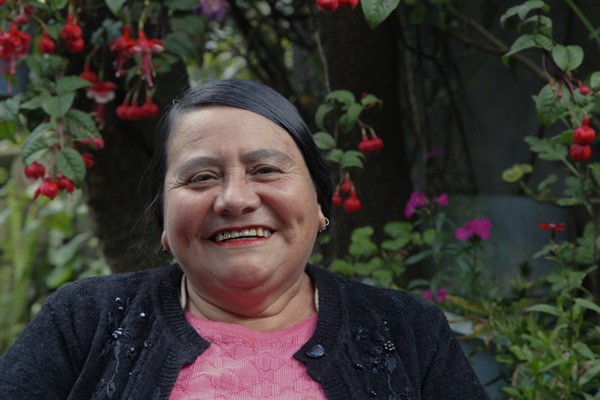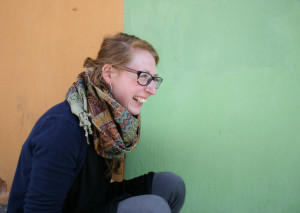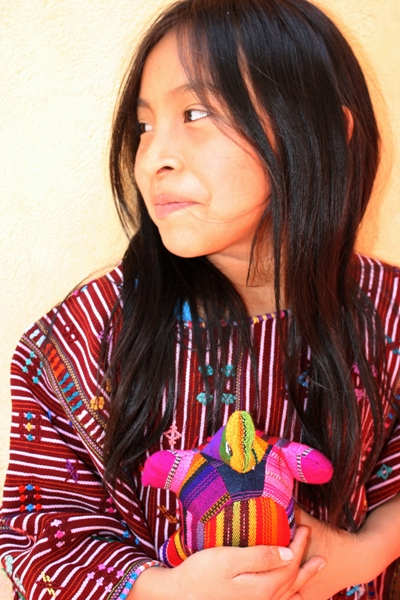“Before Trama, the women in our communities didn’t have their own money and we had to ask for it from our husbands. With Trama, now we have our own money to pay for things like fruit and school supplies for our children. We feel proud to earn our own money, and use the skills we have as weavers to make a living. Even if we don’t speak Spanish, as many women in our communities don’t, we can earn our own money. We also feel proud that people value our work and our Mayan culture, and we feel happy to share our Mayan heritage with the rest of the world.”
– Amparo de León de Rubio, President Trama Textiles
Trama Textiles is a Guatemalan cooperative that organizes women in different parts of the country to produce textile goods like scarves and bags. The organization has local leadership and receives help from international volunteers that have made Trama’s business a more globally integrated endeavor.
Celia Warin, a volunteer for Trama Textiles from the UK answered a few questions about the project for Fashionhedge. She spent three months at Trama as part of her involvement and passion for women’s issues.
“The fact the organisation is 100% worker-owned, and the emphasis within Trama on women’s empowerment and celebrating Mayan culture also really spoke to me”.
Celia Warin
The information provided was very thorough and we appreciate the offers she and other volunteers have done throughout the years to improve the cooperative’s operations. Celia says to love the environment and working with the other international volunteers and the Trama artisans, which she finds inspiring.
Interview with Trama Textiles Communications Manager:
How many women work in Trama Textiles?
We work with over 400 women artisans, organised in 17 weaving groups, across 5 regions in the Western Highlands of Guatemala.
How long have you had an Etsy store? Before that, were your clients mainly locals?
We opened our Etsy store in 2009. Before that, most of our business was done in our local tienda in Xela, and we mainly sold our products to tourists visiting the city. When we started Etsy, the store was pretty small, but in the last two years, we’ve put in a lot of work to develop it and it’s been growing pretty well. Because of Etsy, we’ve been able to start working with international orders and grow our business, which is fantastic. More orders mean more work for our weavers, so they can support themselves and their families. We’re really proud of how our store looks now, and we’re lucky enough to have a dedicated Etsy volunteer who it looking great and takes care of all our customers.
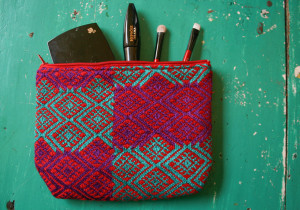
Huipil pouch with red diamonds
It seems that the organization has grown from a small group of women to a bigger commercial project now offering weaving classes and volunteering opportunities, how did this evolution happen? Who makes the executive decisions for the association?
Trama has always worked with a lot of weavers, right from when it was started in 1988. The organisation was created as a direct result of the Guatemalan civil war, to help women from indigenous communities make a living for themselves and their families and start to recover from the war. The war had a devastating impact on indigenous communities in particular, and thousands of men from local communities were killed or disappeared. As well as being incredibly traumatic for the women of the communities to lose their fathers, brothers and sons, it also means that many women were left without any means to support themselves or their families. Trama was started by the women of the communities so they could use the skills they had as weavers to make a living. The organisation was made up of the communities that were most affected by the war, which is why we work across so many regions and with so many weavers. The main difference in the organisation between then and now is that more people know about us, and we’re starting to branch out into the international market, working with wholesale clients and selling our products online.
The weaving classes have been part of our organisation since the 1990s, when our current president Amparo joined Trama. Before that, we ran demonstrations, but there were no opportunities for people to learn to weave themselves. Amparo had been working as a weaving teacher in the north of Guatemala, and got the idea to start weaving classes with Trama. Now the weaving classes are very popular, and the women love teaching our students about their ancient textile culture.
We’ve had volunteers since around the same time. As people came to visit Trama, they often asked us about how they could help us and whether they could volunteer. To start with, our volunteers mainly helped with translating from Spanish into English for tourists, but over time we started to develop a more structured volunteer program, targeting people with specific skills in business, communication and design to come and help us grow as an organisation. We support the president and vice-president in areas where they have less experience, like managing our social media channels and dealing with English-speaking clients. Our volunteers are essential to our organisation, and we’re always so grateful when people come and dedicate their time.
All major decisions are made in consultation with the members of the cooperative – for example, the weavers themselves determine the prices they get paid for their weavings.
The cooperative is made up of 17 weaving groups, each with a Spanish-speaking representative, who makes sure the voices of the women in their group are heard within the organisation. We also have a leadership board, and vice-president and president, who meet regularly to discuss any issues and decide on the direction of the organisation. All the volunteers work for the director and vice-director of the organisation, who make all the decisions about the day-to-day running of the organisation, such as what projects volunteers are working on and which clients we work with.
What is the average hourly wage of a Trama Textiles worker?
At Trama, our weavers are paid for the weavings they make rather than by the hour, and they determine the prices that they get paid. It’s difficult to say exactly how many hours it takes to make a particular product, as each weaver works at a different pace and our weavers don’t work 9-5. Our weavers mainly live in traditional rural communities, and fit their weaving around their other responsibilities, like caring for their children, cooking and going to the market. It’s important to us that the weavers can maintain this traditional lifestyle, which is why the women decided that paying by the piece would be the best way forward.
What are the most common materials used in your crafts? Where do they come from?
All of our textiles are hand-woven from 100% cotton, and we source all of our materials from Guatemalan suppliers. We use premier grade thread in all of our products, and all of our textiles are double-woven and pre-washed so they keep their shape and colour.
Which market has grown more in recent years?
For us, the biggest growth recently has been in our international sales, both in terms of wholesale clients and our Etsy store. Our biggest market is the US, but we also sell to Europe, Canada, Australia and Hong Kong. Thanks to hard work from our volunteers, within the last year, our international sales have really started to take off.
What is your favorite product and what are some of your best sellers?
That’s so hard to decide! I recently bought all my Christmas presents from our store, and there are so many things I like. I love the stuffed animals and small pouches we make, which are great for presents. But for me, my favorite is our Culebriado scarves. I have one in sage, and I wear it all the time. We do them in a ton of different colours, and each one is unique – they’re definitely one of our best-selling items. The other designs we sell a lot of are our striped oversize totes, and our light lace scarves from Sololá.
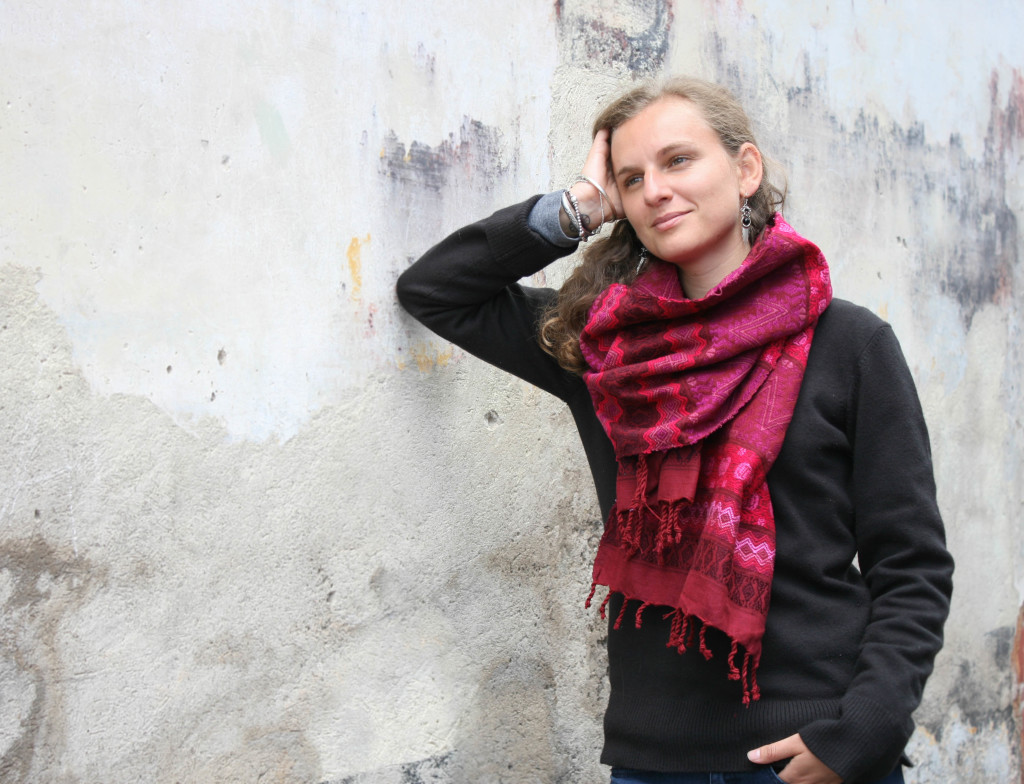
Culebriado scarf
Isabel’s story
Isabel is the representative for our Chirijox weaving group, made up of 20 women, and based in the Nahualá highlands. Isabel’s primary role is to serve as a go-between for Trama and the weavers in her village. She collects orders from Trama’s headquarters in Quetzaltenango and then distributes the work to her colleagues. With Isabel’s former experience as a nurse and as an NGO worker, she is well-suited for this role. She is also one of the few women in her town who can speak Spanish, in addition to the local indigenous language.
Like many other indigenous women in Guatemala, learned her weaving craft as a young girl. At only eight-years-old, Isabel’s mother and grandmother began teaching her how to make an array of handmade textiles, from colourful dresses to opulent tablecloths.
By weaving for Trama and its international customers, Isabel and the women of Chirijox are able to support their families with an artisan craft that holds hundreds of years of tradition. Isabel’s work as a master weaver also sets a level of excellence for other women learning and improving their craft.
“This is a part of our culture,” says Isabel. “I learned this as a girl and I want to pass it on to other young people.”
Isabel sees Trama as a blessing in her life. The organization is able to empower women to become community leaders by providing weaving work in an area where the unemployment rate is high. She looks forward to what the future with Trama holds, “I dream of even more orders to fulfil and even more success”.
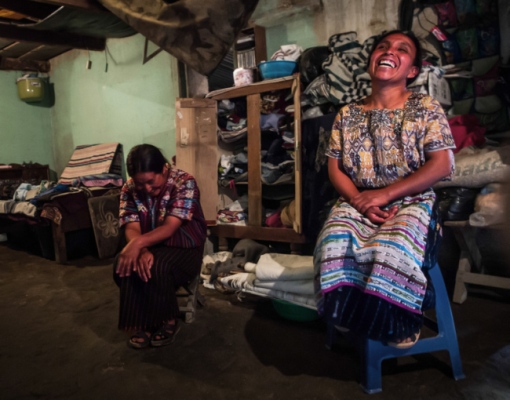
Isabel, group representative
Women empowerment
“Weaving is very important to me, not only because I can earn some money, but so we don´t lose our culture. We want our weaving to continue and our designs to survive.”
“As a widow, I have a lot of expenses I must meet and it´s very expensive to even feed my family. If I didn´t have the association giving me some work, I would have to sell my weavings cheaper to a middleman and I would get paid much less.”
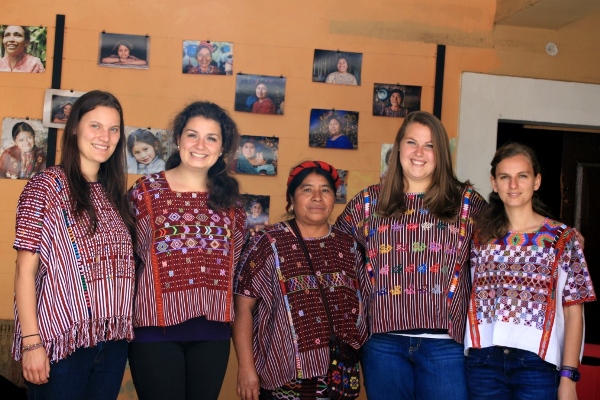
Volunteers with Trama artisan
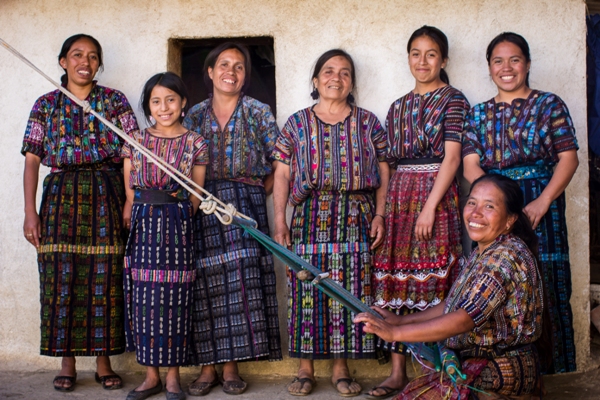
Trama Textiles Weavers
-~-
If you want to learn more about the Guatemalan Civil War, I recommend the movie When the Mountains Tremble, available in its full version on YouTube. It’s a historical and courageous production telling a story still unknown by many: the genocide of Guatemala’s indigenous population.
-~-
Here are my favorite items from Trama:
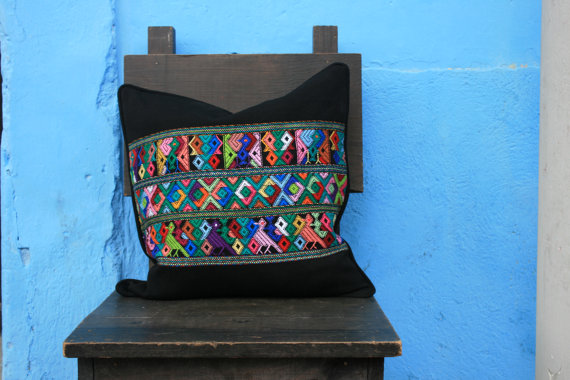
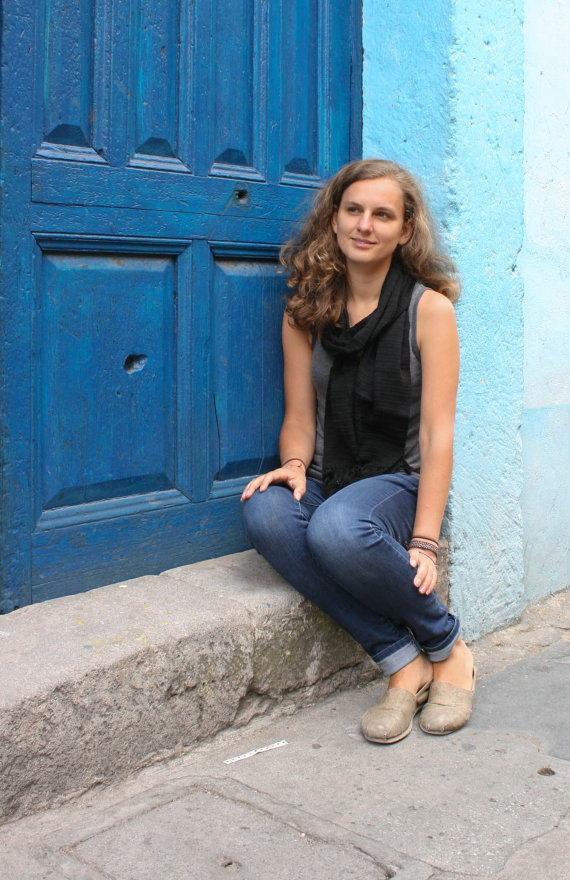
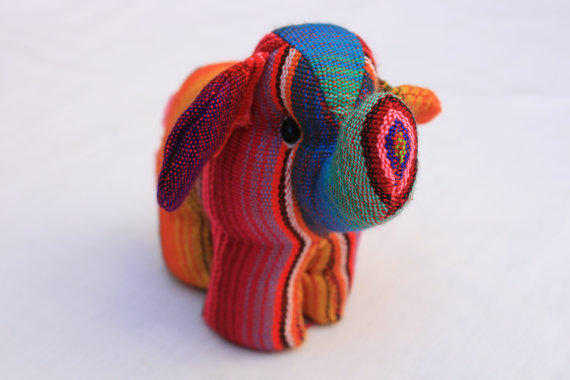
-~-
Where in the world?
-~-
Ethical Fashion Features

Women empowerment

Transparent supply chain

Vote with your money

